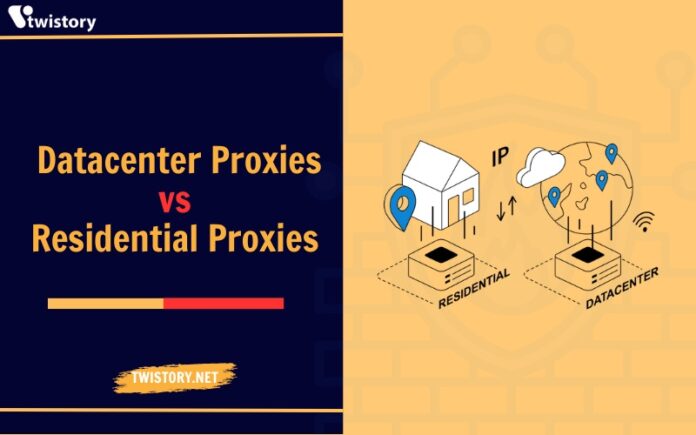The world of proxy IP networks is vast and diverse, catering to a multitude of business needs. Traversing this landscape to pinpoint the ideal proxy server for your specific requirements can be a daunting task. Making an informed decision about the best proxy solution for your business requires careful research into the nuances of different types of proxy servers and their primary functions.
In this exploration, We will focus on exploiting the unique characteristics of the two most popular types of proxy server solutions: datacenter proxies vs residential proxies. Our goal is to provide you with clear insights, enabling you to select the most suitable proxy solution that aligns with your business objectives.
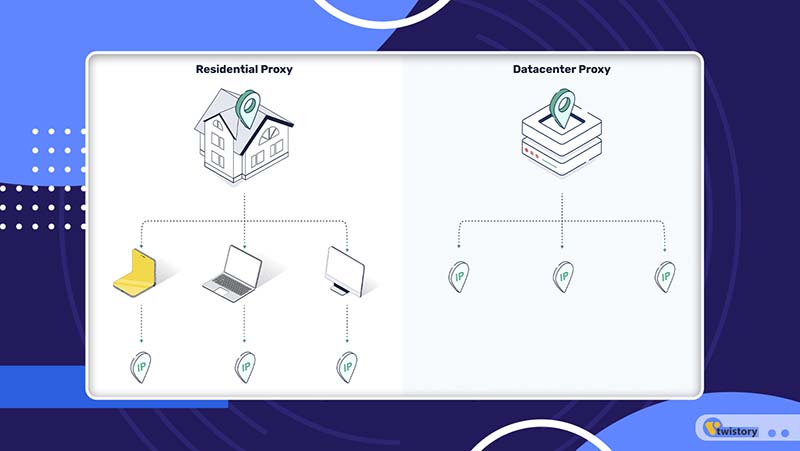
1. Datacenter Proxies: Definition and Characteristics
Datacenter proxies serve as a bridge between a user and the wider internet. These proxies provide IP addresses that are not linked to traditional Internet Service Providers (ISPs). Instead, they’re sourced from third-party cloud providers. A standout feature of datacenter proxies is their ability to offer complete anonymity when browsing online.
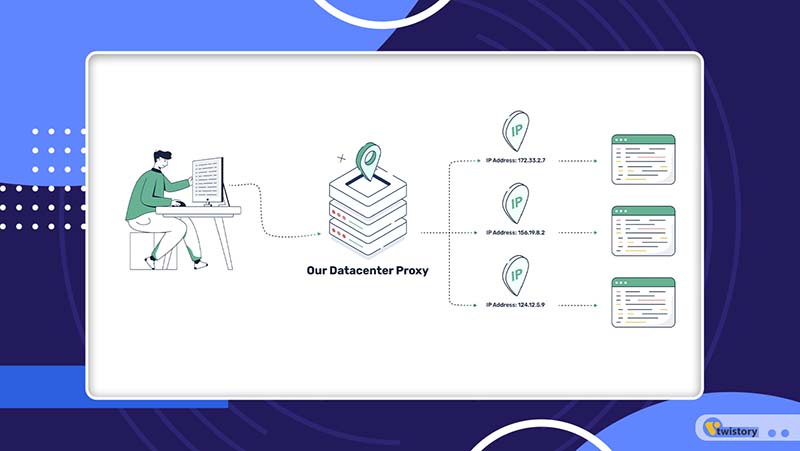
2. Characteristics of Datacenter Proxies
- High-Performance Capabilities: Datacenter proxies benefit from being housed in facilities with exceptionally fast internet connections. Speeds less than 100 Mbps are slow for these proxies, with many offering blistering speeds of 1 Gbps or even 10 Gbps. Moreover, their uptime mirrors that of the hosting server, often achieving more than 99% reliability monthly, thanks to the diligence of major proxy providers.
- Cost-Effectiveness: Creating datacenter proxies is relatively straightforward: it involves renting IP addresses and the servers to host them. This simplicity translates into a lower cost, especially when compared to residential or mobile proxies. Expect to pay significantly less, sometimes even a tenth of the price of other proxy types. Additionally, these proxies often charge for IP access rather than the amount of data used, making them a budget-friendly choice for heavy data usage.
- Ease of Detection: Each IP address is linked to an owner through an identifiable number known as ASN (Autonomous System Number), which is publicly accessible and can be easily checked in any IP database. Datacenter proxies are generally owned by cloud hosting services, which are known not to cater to consumer internet needs. Hence, websites can quickly identify these IPs as they are commonly used by VPNs, corporations, and automated bots. This recognition means datacenter IPs are more prone to being blocked by websites.

3. Residential Proxies: Definition and Characteristics
Residential proxies are a powerful tool for digital anonymity and data gathering. They offer the ability to choose specific locations, such as a country, city, or even a mobile carrier, and browse the internet as though you were a local user in that region. Think of proxies as middlemen that shield you from direct exposure to the web, acting as a cover for your IP address and providing alternative IP addresses from their pool.
When you send a request, it travels through the proxy IP to its server and then reaches the intended website or resource. This process keeps your web activities private and your identity hidden.
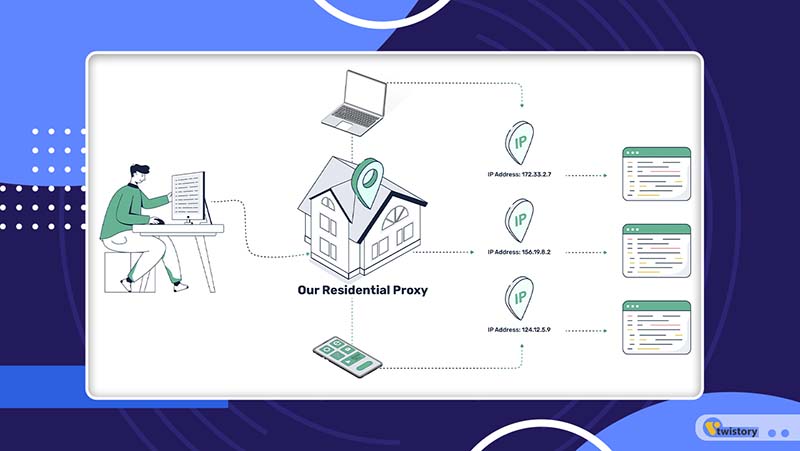
4. Characteristics of Residential Proxies
- Privacy Enhancement: Using a residential proxy means the websites you visit can’t see your actual IP address, thus safeguarding your online activities.
- Boost in Web Scraping Efficiency: Collecting publicly available data from websites is invaluable, but doing it from a single IP can quickly lead to being blocked. Residential proxies rotate your IP address, making it incredibly difficult for websites to detect and block your scraping efforts.
- Reduced Risk of Blocking: While datacenter proxies often use a limited pool of IP addresses, making them easy targets for blocking, residential proxies boast a vast array of IPs from numerous locations globally. This diversity makes them a tougher challenge for websites to block.
- Simultaneous Multiple IP Usage: Top-tier residential proxy services allow the use of multiple IP addresses at once. This feature is particularly beneficial for managing numerous social media accounts simultaneously without triggering any security flags.
- Speed Advantage: In comparison to VPNs and shared proxies, residential proxies generally provide faster connection speeds due to reduced overhead and less shared server usage.

5. Detailed Comparison Between Datacenter Proxies vs Residential Proxies
Datacenter proxies and residential proxies each serve unique needs in the digital landscape. Here is a comparison of their differences and applications:
5.1 Features and Benefits
Datacenter proxies are known for their large array of high-speed IP addresses, available at a more affordable rate. They excel in tasks like extensive scraping or automation where the risk of detection is secondary. These proxies are housed in data centers, offering blazing speeds and cost-effective solutions. On the other hand, residential proxies, provided directly by ISPs and linked to actual residential addresses, present a varied pool of IP addresses that closely emulate the browsing patterns of real users. They excel in anonymity and have a lower risk of detection. This makes them ideal for sensitive tasks like ethical web scraping, ad verification, and accessing location-specific content, as they are less prone to be blocked.
5.2 Performance and Reliability
- Performance: Datacenter proxies typically outpace residential proxies in speed. Dedicated datacenter proxies, in particular, offer superior speeds, thanks to their location in well-connected areas and dedicated resources for processing proxy requests. They handle traffic more efficiently with minimal network interference. Residential proxies, sourced from standard residential internet networks, are inherently slower. They depend on the bandwidth limitations of individual home networks and are subject to additional network overhead, as data travels through slower residential networks.
- Reliability: When it comes to scraping activities, residential proxies are more dependable. They face fewer challenges like CAPTCHAs, geo-restrictions, or IP bans. Datacenter proxies, however, are easier to detect and may not be as reliable for scraping sites with advanced anti-bot measures. The reliability of shared datacenter proxies can be further compromised due to multiple users sharing the same IPs, leading to potential pre-existing blocks. Implementing IP rotation can improve reliability for both proxy types, but residential proxies generally have an edge due to the origin of their IP addresses.
5.3 Cost and Accessibility
Datacenter proxies are generally more budget-friendly. They are sourced from large-scale data centers, which are less expensive to operate and maintain. Unlike residential proxies, there are no additional costs associated with compensating individuals or ISPs for IP addresses. Residential proxies, due to the complexity of sourcing and maintaining them, along with their advanced features like human-like request patterns and precise geo-targeting, come at a higher cost. This price difference reflects the additional capabilities and operational expenses inherent to residential proxies.
6. When to Choose Datacenter Proxies and When to Choose Residential Proxies
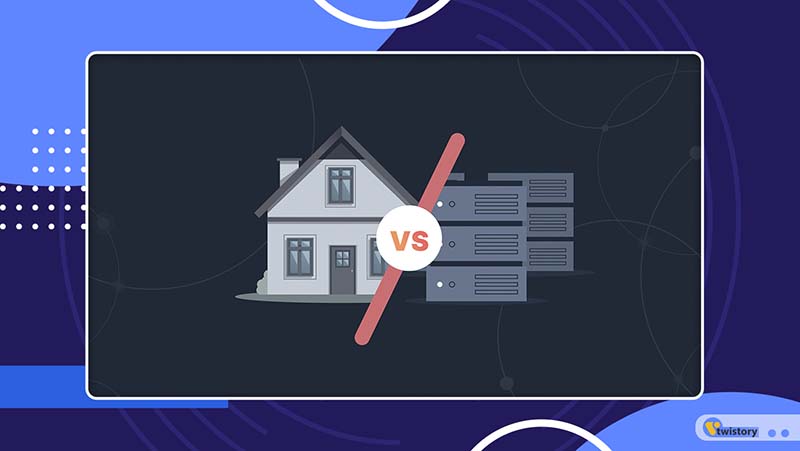
Deciding between datacenter vs residential proxies hinges on your specific requirements. If your main concerns are swift performance and budget-friendliness, and you’re okay with the possibility of being detected and blocked, then datacenter proxies are your go-to option. They deliver rapid speeds and are easier on the wallet, making them ideal for tasks where a high detection risk isn’t a dealbreaker.
On the flip side, if blending in and avoiding detection is paramount – for instance, if you need to appear as a regular internet user – residential proxies are the way to go. Despite being pricier and potentially not as fast as their datacenter counterparts, they offer a higher level of anonymity and a reduced risk of being blocked.
Note: When making your choice, you must weigh the pros and cons of each proxy type in the context of your project goals. For high-volume, less sensitive tasks, datacenter proxies are an efficient choice. For operations where discretion is key, such as market research or content verification across different regions, residential proxies provide a more subtle approach. Always tailor your proxy selection to the specific demands of your task for optimal results.
7. Conclusion
In conclusion, our article on “Datacenter Proxies vs Residential Proxies“ boils down to specific needs and the balancing act between speed, cost, and anonymity. Datacenter proxies offer efficiency and affordability, ideal for tasks where speed is key and a higher detection risk is acceptable. In contrast, residential proxies provide enhanced anonymity and reduced detection risk, perfect for sensitive tasks requiring a more discreet approach, albeit at a higher cost and potentially slower speeds.
For more insightful discussions and practical advice on navigating the digital world, don’t forget to explore more blogs from Twistory. Whether you’re a tech enthusiast, a business professional, or just curious about the digital landscape, Twistory has a wealth of knowledge to offer. Stay tuned for more expert insights and tips that can help you make informed decisions in the ever-evolving world of technology.
>>See more related articles:
1. Reverse Proxy vs API Gateway: Tech Duel Unraveled
2. API Proxy vs API Gateway: Unpacking the Essentials
3. Anonymous Proxy vs VPN: Key Differences

